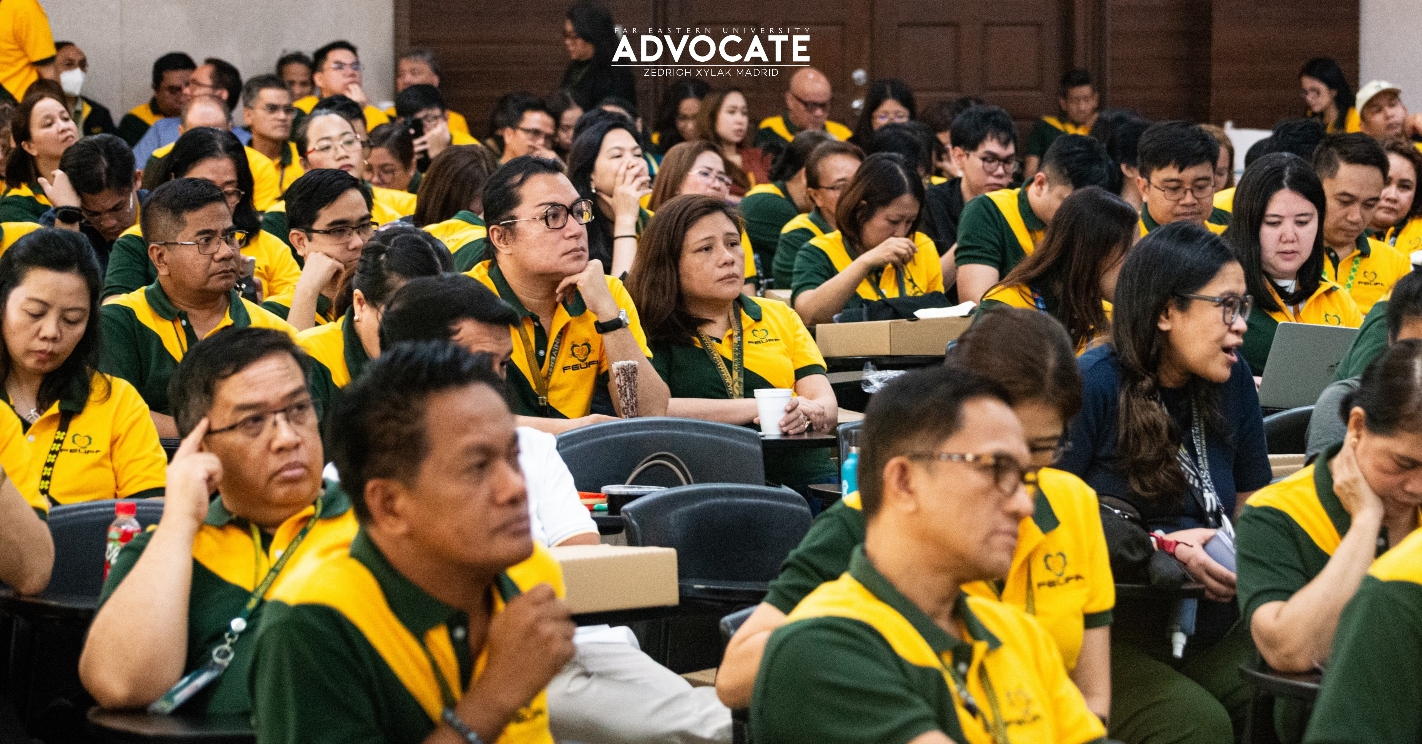
Slovenia express solidarity with PH in WPS conflict
- March 28, 2025 20:54
FEU Advocate
January 17, 2025 20:41

By Mark Vincent A. Durano and Shayne Elizabeth T. Flores
Far Eastern University (FEU) Manila and Makati are set to implement a three-gigabyte (GB) storage limit for all OneDrive accounts due to Microsoft 365’s policy changes starting on March 2, drawing concerns from students who benefit from the significant cloud storage.
Before the changes, students were entitled five terabytes (TB) of storage space, which is now at around 0.06 percent of the original capacity.
Students will be given until February 14 to back up their existing files ahead of a mass cleanup on February 15.
Following the Information Technology Services’ (ITS) announcement on Outlook, students voiced their worries, given Microsoft 365's role in a student-centered learning.
“Collaboration in FAs [formative assessment] was a standard and Microsoft 365 became an integral part of that. Sharing Word documents, transferring audio files that’ll then be compiled either to a video or podcast of which’ll also be uploaded and submitted using the same platform,” third-year Political Science student Cal Fajardo stated in an interview with FEU Advocate.
According to Fajardo, the school-provided storage allowed him to keep track of and refer back to his accumulated courseworks, which is essential in his program where lessons are reoccurring.
Similarly, senior Communication Digital Cinema Track student John David Mardo stated that the Microsoft 365 storage is beneficial for students developing their creative portfolio.
“As a film-student, siyempre gamit na gamit namin siya (of course we use it often) for transferring huge files and materials. Also, dito rin namin tinatago [‘yung] mga school projects namin na maaari naming maisama sa portfolio namin (We hide our school projects here that we can add to our portfolio),” he said.
Given his creative project-heavy program, Mardo noted that the storage policy could compromise their outputs, citing that short-film videos often exceed three GB. As a result, this would compel students to make concessions at their own expense.
“Mapipilitan kaming i-lower ‘yung quality ng projects na ipapasa namin, or need namin gumastos pa ng external hard drives to backup our files or even mag-subscribe pa sa ibang cloud-based storage na babawas pa sa allowance namin as students (We will resort to lower the quality of our projects or we have to spend on external hard drive to backup our files or even subscribe to other cloud-based storage that would come from our allowance),” he expounded.
Furthermore, second-year Communication Convergent Media Track student and FEU NewsdotComm Segment Producer Gabriel Duldulao underlined how the storage limit would restrict student organizations.
Unlike accredited student organizations that utilize school-provided official organization Microsoft accounts and storage, FEU NewsdotComm relies on its student leaders’ individual accounts to store media files. Hence, in light of the new policy, they would be obliged to keep both of their academic and organizational files within the three GB limit.
“Most organizations don't have a specific one drive to host their files so it usually falls rin on the student leaders’ accounts, which would place higher limits on their storage capacity given that not only would they have to store organizational files, but they would also have to store academic files possibly required by their professors for submission of their [formative assessments] and [summative assessments],” Duldulao explained.
The second-year Communication student also highlighted the burden the limit would impose on them as their media coverage files consisting of videos and photos weigh approximately 13 GB.
“Though, yes, we could use other services like Google Drive to send our files, not everyone is privileged enough to purchase a subscription for Google Drive to even have the same amount of storage that OneDrive formerly gave to us,” he added.
Despite being given a one-month leeway to comply with the policy change, Mardo claimed that it would be hard to adjust since they have grown accustomed to the previous OneDrive system.
He also claimed that professors and students would inevitably be pushed to adapt to the new policy on their own.
“Hindi lang naman kaming students ang mahihirapan dito, pati rin [professors] namin dahil sa ganitong changes. So in the end, [professors] and students pa rin ang gagawa ng paraan especially sa pag-transfer and submit ng big files (It is not only us students who will suffer, but also our professors. Both of us will still make a way to transfer and submit big files),” the senior film student said.
Meanwhile, Duldulao and Fajardo plan to explore other storage platforms and subscriptions in place of Microsoft 365 and OneDrive.
Amid awareness of FEU’s limited control over the new policy, students hope that the Administration will provide a clear breakdown of the new implementation as well as consider alternative platforms for storing their files.
While the ITS office specified its announcement on the Manila campuses, the same changes will be cascaded to other FEU campuses as well.
Wide changes
In a meeting prior to the mass emails, ITS met with various student-leaders online regarding the said changes.
ITS Infrastructure and Cybersecurity Head Joseph Paul Sianghio emphasized that the change is not isolated to FEU, with other international institutions affected as well.
Similarly, Harvard University will phase out free storage for university customers while the University of Cincinnati and Korea University announced their curbed storage last year.
In light of various uses for the free storage, Sianghio suggests that the provided storage may not be used for repositories.
“So the personal cloud storage we're talking about here of 3 gig [GB] is really something being offered as a convenience for collaboration, for versioning, but not really as your repository archive, maybe as a starting point for submission,” he said.
Meanwhile, inactive accounts will lose access to their OneDrive accounts after the enrollment period.
ITS is also set to give some practices on how to back up and maximize storage soon.
“And again, when we say tips, it's really things like why accumulate and reach your limits,” the cybersecurity head added.
In response to an inquiry, Sianghio clarified that all user accounts with Microsoft that are active, even organizations will be affected.
“We did mention that part of the best practices is we were going to see what we can do to work with you so that there can be a common repository. So we will have to do a campaign to understand which organizations, both academic and administration organizations and departments have requirement[s],” he stated.
The infrastructure head also shared that the Manila and Makati campuses are considered as one entity entitled for a 100-TB institutional storage from Microsoft. Despite the policy being implemented at a company-basis, FEU has at least four legal entities including Manila, High School, Roosevelt, and Cavite.
ITS plans to move from OneDrive to Sharepoint, citing its formality.
“Your ‘who's in, who's out,’ even the request process on who's got the rights and privileges for access and administration is there. You've got versioning and even have approvals. If you want to make a document approved officially, you've got versioning and approval processes, checking checkout processes for SharePoint,” Sianghio mentioned.
After the implementation of the new storage limit, FEU is given 30 days to tweak their system to fully optimize shared storage.
Sianghio shared that Microsoft allows expanding the storage on a month-by-month basis. According to the tech giant, files will not disappear when the capacity exceeds, however, they cannot be revised anymore.
(Photo by Thea Danielle Mori/FEU Advocate)









